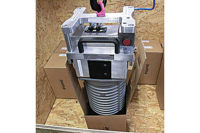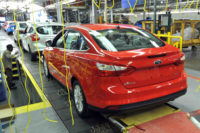Walk through any automotive plant, and there’s a good chance you’ll see lift assists in use for product assembly. Common lift assists include large or small hoists, air balancers, extension arms and end-effectors (clamp, hook, vacuum, magnet, etc.).
For a long time, the end-effector tooling was made only of steel and aluminum. That changed in 2005, when Bilsing Automation GmbH began making graphite carbon fiber (CF) tooling components. Several years later, Ford Motor Co. approved the use of CF components by its lift-assist-system suppliers.
This decision has benefitted Ford in several ways. First, systems with CF components are lighter and easier to use, and increase worker productivity. Equally important, the systems’ lower weight-capacity requirements enable Ford to use overhead balancers and rails that are much smaller and less expensive (by up to 50 percent).
Bilsing’s CF components include conical tubes, single extensions, square profiles, loading feeder beams, T-beams and telescopic beams. All the components are high modulus, durable but not brittle, and weigh less than half as much as those made of steel and aluminum. Each component is produced using a unique axial laying technique that increases carbon fiber strength by up to 40 percent compared with standard material.
Ford suppliers use the components in systems for various operations: pressing; injection molding; and loading, unloading, moving and destacking crossbar beams or panels. Workers can easily adjust the components with Allen wrenches to ensure stability of the lifted part.
Feeder and T beams are offered separately, but can be joined together using an automatic tool interface. The components are bonded with adhesive and then reinforced at the core with steel bolts. In some cases, multiple end-effectors may be directly plugged into feeder beams.
Bilsing says the bond-and-bolt method produces a joint as strong as a steel weld, but at a much lower cost. Before using this process, the company laminated the joints, but it proved to be a too-costly process.
Besides serving the automotive industry, Bilsing provides modular tooling systems for glass, packaging and food manufacturers. It also offers 3D digital simulation and on-site training.
For more information on carbon fiber components, call 586-463-0686 or visit www.bilsing-automation.com.





